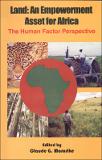| dc.contributor.author | Vengeyi, Obvious | |
| dc.coverage.spatial | Africa. | en |
| dc.date.accessioned | 2016-04-22T15:04:42Z | |
| dc.date.available | 2016-04-22T15:04:42Z | |
| dc.date.issued | 2014 | |
| dc.identifier.citation | Vengeyi, O. (2014) Land as an inalienable asset: lessons from 1 Kings 21:1-29. In: Mararike, C.G. (ed.) Land: an empowerment asset for Africa: the human factor perspective. Harare: UZ Publication, pp. 59-82. | en |
| dc.identifier.isbn | 978-1-77920-110-2 | |
| dc.identifier.uri | https://opendocs.ids.ac.uk/opendocs/handle/20.500.12413/11354 | |
| dc.description | A position paper on the importance of land to African development. | en |
| dc.description.abstract | This chapter offers a biblical basis for the indigenous African philosophy that regards land as an inalienable asset. It argues that to regard land as solely an economic asset is somehow to trivialise it. Land is more than an economic entity. From a Human Factor perspective, it is inseparably connected to the spirituality, identity, history and wellbeing of a people. The land is, therefore, an inheritance hence an entitlement. From an indigenous African perspective, the loss of land is loss of everything that defines an African. The same conception guided the Israelites prior to the introduction of foreign philosophies that reduced land to an economic asset from the ninth century BCE. The struggle between King Ahab and Naboth in 1 Kings 21:1-29 revealed the disharmony that was created thereafter. And the vehemence with which Naboth, a peasant, resisted King Ahab’s request to exchange or buy his ancestral land showed that the peasants refused to recognize both the foreign ideology and its local agents. Naboth and the peasants were aware of their Human Factor content and were prepared to die in defence of their birthright; as did Naboth. The chapter concludes that Naboth and his constituency that involves prophet Elijah and the peasants provide a model of inspiration to the Africans today. On the other hand, King Ahab and Jezebel are models of African leaders, institutions and policies that Africans must resist. | en |
| dc.language.iso | en | en |
| dc.publisher | University of Zimbabwe (UZ) Publications | en |
| dc.rights.uri | http://creativecommons.org/licenses/by-nc-nd/3.0/ | en |
| dc.subject | Economic Development | en |
| dc.title | Land as an inalienable asset: lessons from 1 Kings 21:1-29 | en |
| dc.type | Book chapter | en |
| dc.rights.holder | University of Zimbabwe (UZ) | en |


